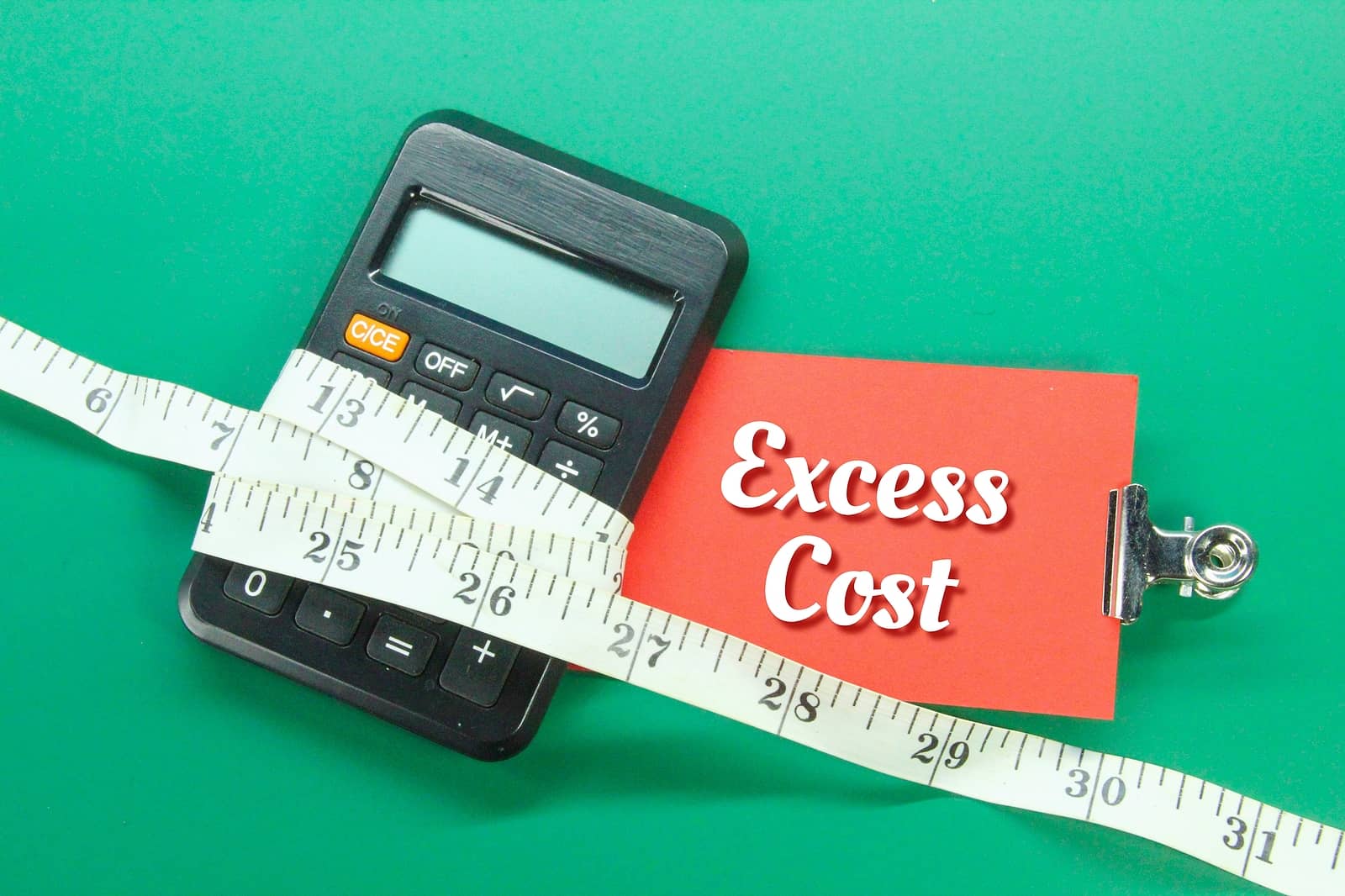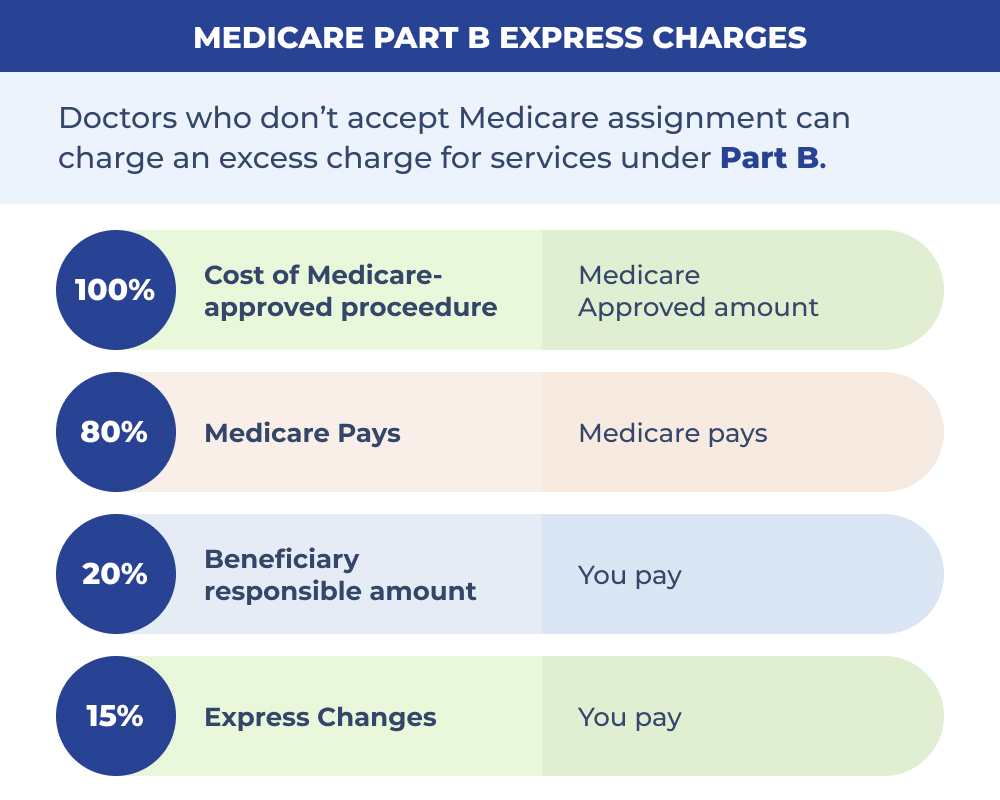
For those of you on Medicare, you may have heard of something called Medicare Excess Charges. But what are they exactly? And how can you avoid them? Keep reading to find out!
Medicare Part B excess charges: What are they?
In some circumstances, Medicare Part B excess charges are an additional fee for Medicare patients. Medicare pays part of the Medicare-approved amount for certain medical services. Beneficiaries may be responsible for paying these Part B excess charges directly out of pocket.
Medicare Part B excess charges occur when a Medicare provider bills an amount higher than the Medicare-approved amount. Providers can charge these extra charges if they accept Medicare but not Medicare assignment. It’s important to know if your healthcare provider accepts Medicare assignment to avoid these costs.
Calculation of Part B excess charges
Excess charges are calculated based on the Medicare-approved amount. For example, suppose you have a medical procedure with a dermatologist to remove a sunspot. Let’s assume the approved amount is $250.
The healthcare provider can charge 15% percent more than the approved amount. 15% of $250 is $37.50. The doctor could charge $287.50. If you have already reached your Medicare Part B deductible, Medicare will pay $200, and you will be responsible for $87.50.

Avoid Medicare excess charges
Medicare excess charges can worry Medicare Part B enrollees, but with a little understanding, there’s no need to fret. Medicare excess charges refer to fees that some healthcare providers charge more than the Medicare-approved amount.
Fortunately, it is possible to avoid Medicare excess charges by researching and planning. Before you make an appointment or receive medical care, check with your provider to see if they take Medicare and whether or not they are willing to accept Medicare’s approved amount as payment in full. Doing so can give you peace of mind knowing you won’t face any unsightly surprises on your bill.
Most doctors that accept Medicare accept Medicare assignment, meaning that most providers don’t charge them. The other way to verify if a provider charges excess charges is to use Medicare’s physician finder tool. It will say if a healthcare provider does or doesn’t accept Medicare assignment.
What to do if you get a bill for a Part B Excess Charge
Medicare Part B excess charges are added to Medicare-approved charges for doctor services and other medical care. Suppose you get a bill that contains Medicare Part B excess charges.
In that case, the first thing you should do is confirm that the Medicare-approved amount has been correctly posted to your account and that any additional charges listed really are Medicare excess charges.
Once you have identified Medicare Part B excess charges on your bill, reach out to the provider to ensure they understand Medicare guidelines.
There may also be ways to avoid Medicare excess charges altogether, so be sure to ask your provider how you can do this during future appointments.
Appealing a Part B Excess Charge
Medicare Excess Charges can burden Medicare beneficiaries financially, but fortunately, some steps can be taken to help avoid them. If you have already incurred Part B excess charges, it may be possible to appeal the charges for reimbursement.
Make sure to document the medical service you received with the provider and then contact your Medicare carrier to initiate an appeal. Be prepared to provide any necessary documentation when filing your appeal.
Medicare offers helpful resources online that can aid in understanding and navigating Part B excess charges, so take full advantage of all the information available when appealing a Medicare Part B excess charge.
States that don’t allow Part B Excess Charges
Part B excess charges can definitely be a headache, but luckily some states take a stand against them. For excess charges to apply, the state must allow them; if they don’t, Medicare recipients in those states will not have these charges billed to them.
Unfortunately, some people might be unaware of this and go ahead with treatments not knowing they could save money. It’s important to stay in the know if you want to ensure you don’t have extra Medicare charges applied to your bill – because each state is different regarding Part B excess charges.
There are 8 states either limit additional charges further or don’t allow them due to the Medicare Overcharge Measure. The states that don’t allow or limit excess charges are Connecticut, Massachusetts, Minnesota, New York, Ohio, Pennsylvania, Rhode Island, and Vermont.
FAQs
What do excess charges mean?
An excess charge is an additional charge that a healthcare provider that doesn’t accept Medicare’s assignment. These charges are up to 15% more than the Medicare-approved amount.
What does it mean to have a Part B excess charge?
If you receive an excessive bill, it means the health care provider you saw accepts Medicare but not Medicare assignment. In this situation, you will be required to pay more than the typical 20% after the program pays 80%. Most healthcare providers nationwide don’t charge excess charges.
Can I avoid an excess charge?
Yes, ask the healthcare provider beforehand if they accept Medicare assignment. If so, they can’t charge excess charges.
What states allow excess charges?
Every state except the following allows excess charges. The ones that do not are: Connecticut, Massachusetts, Minnesota, New York, Ohio, Pennsylvania, Rhode Island, and Vermont
Which Medigap plans cover excess charges?
Currently, only Medigap Plans F and G cover excess charges. Medicare Supplement Plan F is only available to beneficiaries that had Medicare before January 1, 2021.
Can hospitals charge excess charges?
That depends. Excess charges are allowable for Part B. There should be no excess charges if the service is deemed an inpatient. It’ll fall under Part B if it’s outpatient, and excess charges can apply.
Find a Medicare Supplement plan with excess charge coverage
If excess charges are something you’d rather never worry about, a supplement plan can be a valuable asset. Getting a Medigap plan can help you with most — if not all — charges assessed to you that the program doesn’t cover itself.
When using our licensed insurance agents to help you make the most informed decision, getting assistance with picking the right Medicare Supplemental plan is much easier. Along with their knowledge and ability to answer your questions, their service is free for you to use.
We can help educate you on how to avoid excess charges. Give us a call or fill out our online request form so we can find the best plans for your area.
Related Content:
- Top 3 Medicare Supplement Plans
- Top 5 Medicare Supplement Plans
- Medigap vs Medicare Advantage Comparison
- Most Popular Medicare Supplement Plans
- Top 10 Medicare Supplement Companies
- What is SUPER Medicare
- Most Affordable Medicare Supplement Plans
- How High Deductible Medicare Supplement Plans Work
- Are Medicare Supplement Plans Worth It
- Medicare Supplement Letter Plans Reviews (A-N)
- What Are Medicare SELECT Plans
- Average Cost of Medigap Insurance Plans
- Difference in Medicare Advantage HMO vs PPO
- 5 Essential Tips for Snowbirds: Mastering the Seasonal Migration